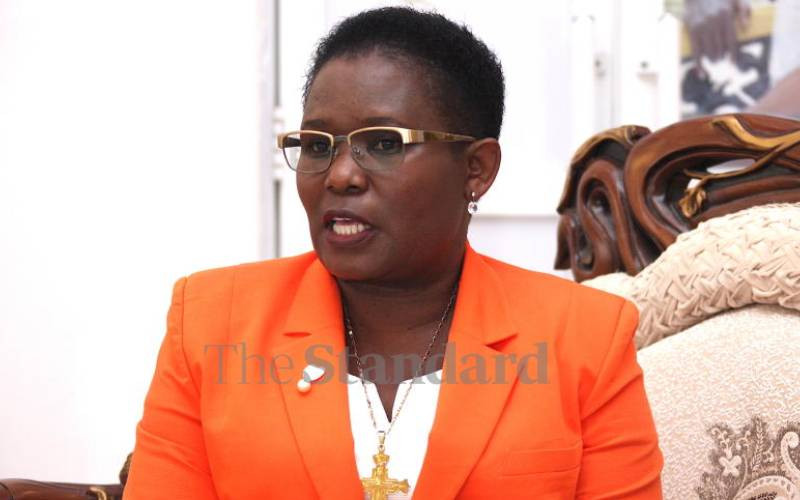 |
|
Controller of Budget Agnes Odhiambo. [PHOTO: FILE] |
By MACHARIA KAMAU and STEVE MKAWALE
NAIROBI, KENYA: Governors spent ridiculously high amounts of money in allowances and other unnecessary expenses, leaving their counties with little or no money for development.
More than half of the 47 counties —27 to be exact — did not spend a single cent on development during the quarter between July and September.
A report by the Office of the Controller of Budget shows that during the first three months of 2013/2014 financial year, counties spent a measly 7 per cent of the money available to them (or Sh872.9 million) on development while splashing billions on personal emoluments for county staff and Members of County Assemblies.
The report shows that out of the total expenditure, personnel emoluments accounted for 55 per cent, operations and maintenance 38 per cent and development expenditure only 7 per cent.
The Controller of Budget recommends the rationalisation of expenditure across the board to free up money for development.
The sorry state of affairs in counties is a gross violation of the Public Finance Management Act that requires counties to allocate at least 30 per cent of their budget to development.
“During the first quarter of financial year 2013/2014, 27 counties had no expenditure on development… (Overall) the counties spent Sh872.9 million on development activities which constituted 7 per cent of the total expenditure,” said the Controller of Budget’s report.
sitting allowances
Among counties that committed their entire budgets to recurrent expenditure and left nothing for development are Mombasa (Sh767 million), Kisumu (Sh338.4 million), Uasin Gishu (Sh278 million), Murang’a (Sh258 million), Makueni (Sh271 million) and Homa Bay (Sh280 million).
The report indicates that huge sums of money was used to pay sitting allowances for Members of the County Assemblies and for foreign travel by governors and their chief officers, as well as hospitality. The MCAs pocketed Sh473 million in the period under review while foreign and local travel consumed Sh4.9 billion within the same duration.
“Analysis of the operations and maintenance expenditure depicts that counties cumulatively spent Sh1.07 billion on travel (both foreign and domestic), Sh241.9 million on conferences and hospitality and Sh161.2 million on training. Further, Sh708.5 million was spent on purchase of motor vehicles.”
The county governments spent Sh7.11 billion (55 per cent) of total expenditure on staff compensation. Counties that had the highest proportion of their expenditures going into personnel emoluments were Kisii (83.7 per cent), West Pokot (81.4 per cent) and Kisumu (79.3 per cent).
wage bill
The Controller of Budget called for the speedy formulation of a national policy to contain the high wage bill at both levels of government, as stipulated under Sections 15(2) (b) and 107(2) (c) of Public Finance Management Act. The Act provides for regulations to guide personnel expenditure and once implemented, will inform a national policy on wage bill.
Stay informed. Subscribe to our newsletter
The Controller of Budget notes that while counties had committed to setting aside at least 30 per cent of the money available to them to development, many of them did not and only one crossed the 30 per cent threshold during the quarter.
According to the report, counties that had the highest ratio of development to total expenditure were Nyeri (30.3 per cent), Tana River (26 per cent) and Tharaka Nithi (25.5 per cent).
“The PFM Act requires the counties to allocate at least 30 per cent of their budgets for development activities over the medium term,” said the report.
“Although all counties met this threshold in their budgetary allocations, actual expenditure on development activities remains a major challenge given that on average only 7 per cent of total expenditure went to development programmes during the first quarter of FY2013/2014.”
The counties also spent colossal amounts in sitting allowances to MCAs, which the Controller of Budget says is unsustainable.
“The counties spent Sh473.4 million for payment of sitting allowances. Nairobi City County spent the highest amount of Sh113.3 million followed by Kisii, Migori and Meru which spent Sh28.9 million, Sh25.2 million and Sh17.1 million respectively. Counties that had the least expenditure were Turkana, Tana River and Lamu of Sh1.1 million, Sh1.3 million and Sh1.4 million respectively,” said the report.
“The office recommends that sitting allowances for MCAs be rationalised as this expenditure may not be sustainable given the already escalating wage bill nationally.”
According to the report, the counties had a poor absorption capacity of funds available to them, resulting in Sh27 billion remaining unspent during the first quarter.
“The analysis shows that Sh27.1 billion of the total revenue available remained unspent… This low uptake of funds could be attributed to the failure of most counties to meet the conditions for the release of funds as stipulated in the Public Financial Management Act, 2012,” said the report.
necessary legislation
Among the likely contributing factors is the agitation for higher pay that resulted in adjournment of many county assembly sessions and delay in the enactment of the County Allocation of Revenue Act, 2013, which affected the disbursement of the national shareable revenue to counties.
The Controller of Budget wants the counties to fully implement the Public Finance Management Act (PFMA) as well as the Integrated Financial Management Information Systems (IFMIS) and also put in place elaborate procurement plans and continuously build capacity on financial management for their staff.
“This will ensure that good financial control mechanisms are put in place and efficient service delivery to the public is achieved.
Further, the county assembly, the legislative arm of the county government, should strive to fulfil their constitutional mandate by ensuring that all the necessary legislation are passed on time and provide oversight over the activities of the Executive, said the Controller of Budget.
 The Standard Group Plc is a
multi-media organization with investments in media platforms spanning newspaper
print operations, television, radio broadcasting, digital and online services. The
Standard Group is recognized as a leading multi-media house in Kenya with a key
influence in matters of national and international interest.
The Standard Group Plc is a
multi-media organization with investments in media platforms spanning newspaper
print operations, television, radio broadcasting, digital and online services. The
Standard Group is recognized as a leading multi-media house in Kenya with a key
influence in matters of national and international interest.
 The Standard Group Plc is a
multi-media organization with investments in media platforms spanning newspaper
print operations, television, radio broadcasting, digital and online services. The
Standard Group is recognized as a leading multi-media house in Kenya with a key
influence in matters of national and international interest.
The Standard Group Plc is a
multi-media organization with investments in media platforms spanning newspaper
print operations, television, radio broadcasting, digital and online services. The
Standard Group is recognized as a leading multi-media house in Kenya with a key
influence in matters of national and international interest.










